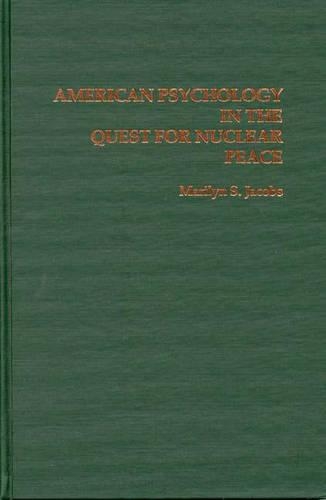
American Psychology in the Quest for Nuclear Peace
(Hardback)
Publishing Details
American Psychology in the Quest for Nuclear Peace
By (Author) Marilyn S. Jacobs
Bloomsbury Publishing PLC
Praeger Publishers Inc
17th February 1989
United States
Classifications
Tertiary Education
Non Fiction
355.0217
Physical Properties
Hardback
202
Description
This book is a treatise on the history of American psychology's role in nuclear war prevention. So writes Marilyn S. Jacobs in the preface to American Psychology in the Quest for Nuclear Peace. This timely and important study will facilitate the work of those psychologists who wish to use their knowledge and expertise in the cause of nuclear war prevention. Jacobs places the psychologist's struggle for nuclear peace in historical perspective and examines the complicated context in which the threat of nuclear war is embedded; one which is influenced by international relations, economic and political systems and weapons technology. Student and professional psychologists, political scientists, as well as the general reader concerned with the threat of nuclear war will find this book imperative reading. The study begins by examining the psychologist's role of social responsibility in the nuclear dilemma. Why is psychology involved How did it become involved What is the nature of the involvement Is it appropriate that psychology be involved The book is directed toward these questions. Jacobs interviews prominent individuals in the peace movement, most notably, Herbert Kelman, Irving Janis, Ralph White, and Thomas Milburn. Other chapters explore the psychologist's role as scientist, government consultant, and social activist.
Reviews
A well-researched account of how individual psychologists and organizations have tried to meet the challenge of the nuclear age.-Reference & Research Book News
Jacobs, a psychologist in private practice, has put together a good introduction to the history of American psychology in the antinuclear movement. This balanced work is based on a fairly thorough review of the literature and includes interviews with several dozen psychologists and other social scientists. The apparatus includes an index an extensive bibliography, several appendixes, and excellent footnotes. Jacobs does not stress psychoanalytic theory, polemics, or reviews of empirical studies. This book is really just a history that starts in the late 1930s with the "parlor pinks" of the Depression, picks up in the late 1940s with concerns about the atomic bomb, and goes into the 1980s nuclear freeze campaign. . . . This work, however, remains essential reading to anyone interested in either the history of the peace movement or the history of American psychology. Recommended for graduate libraries.-Choice
"A well-researched account of how individual psychologists and organizations have tried to meet the challenge of the nuclear age."-Reference & Research Book News
"Jacobs, a psychologist in private practice, has put together a good introduction to the history of American psychology in the antinuclear movement. This balanced work is based on a fairly thorough review of the literature and includes interviews with several dozen psychologists and other social scientists. The apparatus includes an index an extensive bibliography, several appendixes, and excellent footnotes. Jacobs does not stress psychoanalytic theory, polemics, or reviews of empirical studies. This book is really just a history that starts in the late 1930s with the "parlor pinks" of the Depression, picks up in the late 1940s with concerns about the atomic bomb, and goes into the 1980s nuclear freeze campaign. . . . This work, however, remains essential reading to anyone interested in either the history of the peace movement or the history of American psychology. Recommended for graduate libraries."-Choice
Author Bio
MARILYN S. JACOBS is a clinical psychologist in private practice. She received a doctorate from the California School of Professional Psychology and holds membership in the American Psychological Association, International Council of Psychologists, and Psychologists for Social Responsibility
